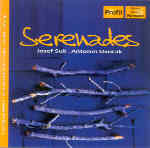This manic-depressive coupling features a scrambled, spastic (in the finale) account of the Suk, paired with a dismal, droopy account of the Dvorák. In the former, edgy, poorly tuned violins scratch their way through the work in a manner notably devoid of charm and lyrical freshness. It frankly does not sound as though the players have had the chance to get comfortable with the music, despite the fact that it poses no exceptional technical difficulties (save for intonation, evidently). In the Dvorák Serenade, the ensemble sounds strangely out of whack in the opening movement, where melody and accompaniment can’t quite seem to get together. The ensuing waltz is totally flat-footed and tensionless, and the Larghetto is so rhythmically flaccid that it seems to go on forever. This isn’t merely a matter of slow tempos, but rather of phrasing and accent. Even the relatively alert finale fails to build to any sort of musical culmination. In short, the performance is a disaster in a piece that’s almost impossible to kill.
As a bonus, and I use the term advisedly, you get two absolutely atrocious performances of a couple of Slavonic Dances. No way is conductor Volker Hartung’s soupy, enervated Op. 72 No. 2 a true Allegretto grazioso, and Op. 46 No. 1 begins less with a tutti chord than with a musical “smear”, followed by a noisy hullabaloo in which the accompaniment drowns out the melody. Excellent sonics capture every disgusting detail. Just what is the European New Philharmonic Orchestra anyway? I don’t recall ever hearing from the European Old Philharmonic Orchestra, but judging from the results here its replacement surely does not represent an improvement. And as for Hartung, who presides over this mess, it’s nice that (as the booklet notes indicate) he believes in Montesquieu’s dictum that “It is always the adventurers who do great things”–but perhaps he and his band should adventure less and rehearse more.
































